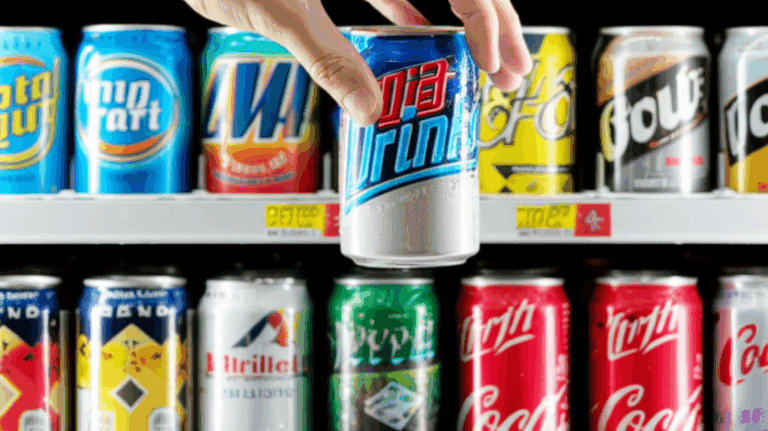The allure of diet drinks lies in their promise: the sweetness and fizz of soda without the calories and sugar. For years, they’ve been marketed as a guilt-free alternative, especially appealing to those watching their weight or managing diabetes. However, emerging research is raising serious questions about whether these beverages truly live up to their “healthier” image. Recent studies have even linked diet drink consumption to an increased risk of developing diabetes. Let’s dive into the science and explore why diet drinks might not be the virtuous choice they appear to be.
The Sweet Deception: Unpacking Diet Drinks
Diet drinks, at their core, are beverages that use artificial or non-nutritive sweeteners (NNS) instead of sugar. This substitution significantly reduces the calorie content, making them attractive to individuals seeking to manage their weight or limit sugar intake. Common artificial sweeteners found in diet drinks include:
- Aspartame: About 200 times sweeter than sucrose (table sugar).
- Saccharin: One of the oldest artificial sweeteners, also significantly sweeter than sugar.
- Sucralose: Approximately 600 times sweeter than sucrose.
- Acesulfame Potassium (Ace-K): Often used in combination with other sweeteners.
- Stevia: A natural sweetener derived from the stevia plant.
While these sweeteners provide a sweet taste without the caloric load of sugar, their impact on the body is far from neutral.
The Alarming Spike: Diet Drinks and Diabetes Risk
A recent analysis of data from the Coronary Artery Risk Development in Young Adults (CARDIA) study presented at NUTRITION 2025, revealed a concerning link between diet drink consumption and diabetes risk. The 30-year study, including 4,654 adults, found that participants in the highest quintile of diet beverage intake had a significantly higher risk of developing diabetes compared to those in the lowest quintile. Specifically, consuming higher amounts of diet drinks and saccharin was associated with an elevated risk of developing diabetes.
Moreover, a new study links frequent diet drink intake to a higher risk of developing diabetes. Those who drank the most diet soda had a 129% greater risk of getting diabetes and high saccharin intake was linked to a 110% increased risk of developing diabetes.
This isn’t an isolated finding. Other studies have also suggested a connection between artificial sweetener consumption and an increased risk of type 2 diabetes. While some researchers propose a “reverse causation” explanation (people at higher risk for diabetes may switch to diet drinks), the growing body of evidence warrants a closer look at the potential mechanisms at play.
Unpacking the Mechanisms: How Diet Drinks Might Increase Diabetes Risk
Several potential mechanisms could explain the surprising link between diet drinks and an increased risk of diabetes:
1. Gut Microbiome Disruption
The gut microbiome, the complex community of microorganisms residing in our digestive tract, plays a crucial role in various aspects of health, including glucose metabolism and insulin sensitivity. Artificial sweeteners can disrupt the delicate balance of this microbial ecosystem.
- Altered Gut Bacteria Composition: Studies have shown that artificial sweeteners like saccharin and sucralose can cause significant shifts in the composition and function of gut bacteria. Some studies report a decrease in beneficial bacteria and an increase in harmful strains. These changes can impair the body’s ability to effectively regulate glucose levels.
- Gut Dysbiosis: Sucralose consumption can induce gut dysbiosis (imbalance) and altered glucose and insulin levels in healthy young adults.
- Impact on Metabolic Pathways: Artificial sweeteners can lead to alterations in metabolic pathways linked to glucose tolerance and dysbiosis, potentially contributing to glucose intolerance.
2. Insulin Resistance and Glucose Intolerance
Insulin resistance, a condition in which cells become less responsive to insulin, is a key characteristic of type 2 diabetes. Some research suggests that artificial sweeteners may contribute to insulin resistance.
- Reduced Insulin Sensitivity: Some studies indicate that artificial sweeteners in diet soda may decrease insulin sensitivity and increase insulin resistance, particularly in people with type 2 diabetes.
- Glucose Intolerance: Common alternatives to sugar can affect intestinal bacterial communities, with some reducing the body’s ability to regulate blood glucose levels. This can push the body towards glucose intolerance, where tissues struggle to absorb glucose from the blood.
3. The “Sweet Taste” Effect
The sweet taste of artificial sweeteners may trigger physiological responses that inadvertently affect glucose metabolism.
- Insulin Release: The body may release insulin in response to the sweet taste, even though there is no actual sugar present. This can lead to an imbalance in insulin secretion and potentially contribute to insulin resistance over time.
- Increased Cravings: Artificial sweeteners may increase cravings for sweet and high-calorie foods. This can lead to overeating and weight gain, further increasing the risk of diabetes.
4. Weight Gain Paradox
While diet drinks are often consumed to manage weight, some studies suggest they may paradoxically contribute to weight gain, particularly abdominal fat accumulation.
- Increased Appetite: Diet soda may stimulate the appetite, leading to increased food cravings and potentially higher calorie intake.
- Metabolic Syndrome: Diet soda has links to metabolic syndrome, which can worsen diabetes or increase the risk of developing type 2 diabetes.
- Abdominal Fat Accumulation: Some studies have found that people who drink diet soda gain almost triple the abdominal fat over nine years as those who don’t drink diet soda.
Beyond Diabetes: Other Health Concerns
The potential health risks associated with diet drinks extend beyond diabetes. Research has linked their consumption to:
- Cardiovascular Problems: Increased risks of stroke, coronary heart disease, heart attacks, and atrial fibrillation.
- Kidney Problems: Increased risk of chronic kidney disease and kidney stones.
- Dental Erosion: The acidity of diet drinks can damage tooth enamel, leading to dental erosion and cavities.
- Liver Disease: High amounts of diet soft drinks have been linked with liver disease, which is based on inflammation.
- Headaches and Migraines: Artificial sweeteners may trigger headaches and migraines in susceptible individuals.
- Changes in Bone Density: Diet soda contains phosphorus, which may decrease bone density and increase the risk of osteoporosis.
Rethinking Your Drink: Healthier Alternatives
If diet drinks aren’t the ideal choice, what are some healthier alternatives to quench your thirst and satisfy your cravings?
- Water: The simplest and most essential beverage for hydration.
- Sparkling Water: Offers the fizz of soda without the sugar or artificial sweeteners. Add a splash of juice or slices of fruit for flavor.
- Unsweetened Tea (Hot or Iced): Green tea, black tea, and herbal teas are packed with antioxidants and offer various health benefits.
- Coffee (Black or with Minimal Additives): Moderate coffee consumption has been linked to a reduced risk of several diseases.
- Fruit-Infused Water: Add slices of fruits, vegetables, and herbs to water for a refreshing and flavorful drink.
- Kombucha: A fermented tea beverage that is good for your gut.
- Homemade Lemonade: Making lemonade at home is a good alternative because you can control the ingredients that go into it.
The Bottom Line: Moderation and Informed Choices
While occasional consumption of diet drinks may not pose significant harm, the evidence suggests that regular, long-term intake may not be as beneficial as once thought. The potential risks, including an increased risk of diabetes, gut microbiome disruption, and other health concerns, warrant a more cautious approach.
Making informed choices about what you drink is crucial for your overall health. Opting for natural, unsweetened beverages like water, tea, and coffee, and limiting your intake of both sugary and artificially sweetened drinks, is a step towards a healthier lifestyle. It’s time to rethink your drink and prioritize beverages that truly nourish your body.







